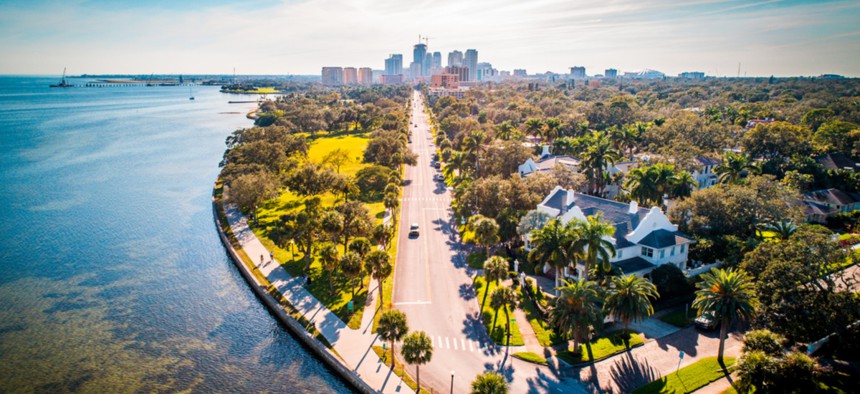State and Local Officials Want to See Climate Policy Support—and Funding—Under Biden Administration

St. Petersburg, Florida. Shutterstock
At a virtual event held by the NewDEAL Forum, state and local officials discussed their next steps on climate policy.
State and local leaders who have made climate change mitigation and prevention policies a key priority say they are looking forward to a comprehensive policy shift under President-elect Joe Biden.
At a Wednesday event held by the NewDEAL Forum, a network of progressive state and local officials, leaders discussed their climate priorities for the next few years, along with their hopes for what the incoming administration will offer state and local governments. Mainly, the leaders, who included mayors, statewide officials, and city council members, said they want—and expect to see—increased federal coordination and financial support for climate initiatives.
“The key to dealing with climate change … is to try to do it in a collaborative way,” said Andria McClellan, a city council member in Norfolk, Virginia.
Norfolk, which sits on sinking land and has 144 miles of coastline, is a site of frequent flooding. But it’s been difficult for the city to plan for sea level rise while only working within its borders. McClellan wants to see federal regional planning dollars for climate projects the way there are for infrastructure—because, as she notes, flooding is watershed-based, not something that happens neatly along lines drawn on a map.
“There’s no mechanism for [regional planning] currently. It would be a huge help,” she said. “A more holistic perspective is really important.”
Boise Mayor Lauren McLean also said she hopes the next administration will be able to find more money for projects, especially considering that state and local budgets have been clobbered by the coronavirus pandemic and the ensuing recession. The continued economic struggles for cities make it more difficult to find the money to meet climate goals, like Boise’s plan to hit 100% clean electricity by 2035.
In coastal St. Petersburg, Florida, Mayor Rick Kriseman said that his city also doesn’t have the resources to keep up recent strategies, such as an energy loan for low income families to install solar panels on their homes. With the sunset of the federal solar tax credit looming, Kriseman said the loss of these opportunities “takes a tool from our tool box” at a critical time for the city, which he said is “one of the most vulnerable” in the country to climate change.
Even as the amount of federal funding that will go toward climate change mitigation strategies remains up in the air, some said that Biden’s presence in the White House alone will make efforts at the state and local level easier. Josh Freed, the senior vice president of climate and clean energy at Third Way, a think tank in Washington D.C., said that state and local climate action “happened in the past four years despite the enormous drag of a federal government” that withheld financial support and filed lawsuits against states and localities that tried to make progress on climate initiatives. “Those things added up and created real challenges,” he said.
Under the Trump administration, the federal government withdrew from the international Paris climate agreement, weakened standards for power plant emissions and vehicle fuel efficiency, and expanded the public lands open to mining and drilling. Trump rolled back Obama-era environmental regulations, calling them “massive obstructions” to industry projects.
As part of his transition efforts, Biden has flagged climate change as one of the four key priorities, touting the potential economic benefits of shifting to greener technologies. But political observers have also been cautious about the incoming president’s ability to make sweeping climate policy changes, particularly if Republicans retain control of the Senate. That will be decided in January, after runoff elections in Georgia.
In the past four years, the absence of federal action combating climate change led to a rush of state and local actions to fill the void. Governors committed to meeting the emission reduction goals of the Paris agreement within their own borders. Democratic state attorneys general waged a war over regulatory changes to environmental standards. Mayors set climate goals for their cities and city councils approved sweeping plans to address emissions.
But these efforts haven’t always been successful, with the Brookings Institution recently noting that two-thirds of cities with climate targets are behind on meeting those goals. Many cities, too, haven’t signed onto the effort.
Many activists were hopeful that the 2020 election season would see more Democrats with plans to address climate change elected to statewide office—but those gains failed to materialize in state legislatures, leading some to believe the prospect of action on climate change at the state level is severely diminished.
In Wisconsin, Republicans hold control in both the state House and Senate, and have often wielded that control to stymie the climate policy goals of Democratic Gov. Tony Evers and Lt. Gov. Mandela Barnes.
“Unfortunately, we find ourselves doing a lot of governing by executive order,” Barnes said, citing policies they advanced through this process like creating the Office of Sustainability and Clean Energy and forming the governor’s task force on climate change. In states like his, where a Republican-controlled legislature isn’t enthusiastic about pursuing legislation around climate change, Barnes said he sees a lot of opportunities for movement at the local level.
“It forces us to be innovative,” he said. “But I think there is so much opportunity for local government officials to step up and be the leaders.”
Emma Coleman is the assistant editor for Route Fifty.
NEXT STORY: Ahead of Thanksgiving, Cities See Surge in Demand for Covid Tests






